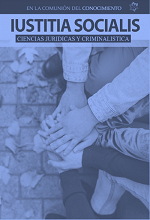Legalization of equal marriage in Ecuador
DOI:
https://doi.org/10.35381/racji.v5i3.1139Keywords:
Constitutional right, sexual role, minority sexual group.Abstract
This investigation is based on the premise of the legal performance and interpretation of the first level judges and of the Constitutional Court, who advocated knowledge of both the protection actions and the consultation of the rule that resulted in unconstitutionality, that after they denied the right to equal marriage. The objective is to analyze the demand for legalization of equal marriage in Ecuador and the legal effects caused by the decision of the Constitutional Court in this case. It was elaborated under the quantitative paradigmatic modality, through the method of documentary analysis, it was explored and analyzed information in normative documents, among them, the Constitution of the Republic of Ecuador. It is concluded that the Constitution defined marriage as the union of a man and a woman, giving it a heterosexual nature, developing a rule with a constitutional level and openly opposing a series of principles and standards of human rights.
Downloads
References
Asamblea Nacional Constituyente de la República del Ecuador, (2008). Constitución de la República del Ecuador. Montecristi. Registro Oficial 449 de 20-oct-2008. Recuperado de https://n9.cl/sia
Asamblea Nacional del Ecuador. (2016). Ley Orgánica de Gestión de la Identidad y Datos Civiles. [ Organic Law on Identity Management and Civil Data]. Registro oficial Suplemento 684 de 04-feb-2016.
Congreso Nacional del Ecuador. (1970). Código Civil. Título preliminar. [Civil Code] Quito, Pichincha, Ecuador: Registro Oficial No. 104.
Consejo de la Judicatura (2016) Dirección Nacional de Estudios Jurimétricos y Estadísticos Causas ingresadas. Recuperado de: https://n9.cl/qum60
Corte Constitucional del Ecuador. (12 de junio de 2019). Causa No. 0010-18-CN [Cause No. 0010-18-CN] Consulta de constitucionalidad de norma. Quito, Pichincha, Ecuador: Corte Constitucional del Ecuador. Recuperado de: https://n9.cl/lahet.
Corte Constitucional del Ecuador. (12 de junio de 2019). Sentencia No. 11-18-CN-19
[Judgment No. 11-18-CN-19] Recuperado de: https://n9.cl/5mxz. Matrimonio igualitario. Quito, Pichincha, Ecuador: Corte Constitucional del Ecuador. Dau-Lin, H. (1932). Die Verfassungswandlung [The constitutional change]. Berlín: Walter de Gruyter.
Corte Interamericana de Derechos Humanos Opinión Consultiva OC-24/17 (24 de noviembre de 2017) Solicitada por la República de Costa Rica Identidad de género, e igualdad y no discriminación a parejas del mismo sexo. Recuperado de: https://n9.cl/b93b
Molina-Ricaurte, C., y Carrillo-Cruz, Y. (2018). El matrimonio de parejas del mismo sexo y la Corte Constitucional de Colombia. [The marriage of same-sex couples and the Constitutional Court in Colombia]. Revista de Derecho. 31(1), 79-103. http://dx.doi.org/10.4067/S0718-09502018000100079
Nuñez-Leiva, I., (2009) Garantismo Espurio. [Spurious Guarantee] Ius et Praxis,16(2),495-498. http://dx.doi.org/10.4067/S0718-00122010000200019
Organización de Naciones Unidas. (16 de diciembre de 1966). Pacto Internacional de Derechos Civiles y Políticos. [International Covenant on Civil and Political Rights]. Parte III. Nueva York, Nueva York, Estados Unidos: Registro Oficial No. 101. Obtenido de https://n9.cl/sfmwn
Published
How to Cite
Issue
Section
License
CC BY-NC-SA : Esta licencia permite a los reutilizadores distribuir, remezclar, adaptar y construir sobre el material en cualquier medio o formato solo con fines no comerciales, y solo siempre y cuando se dé la atribución al creador. Si remezcla, adapta o construye sobre el material, debe licenciar el material modificado bajo términos idénticos.
OAI-PMH URL: https://fundacionkoinonia.com.ve/ojs/index.php/Iustitia_Socialis/oai










